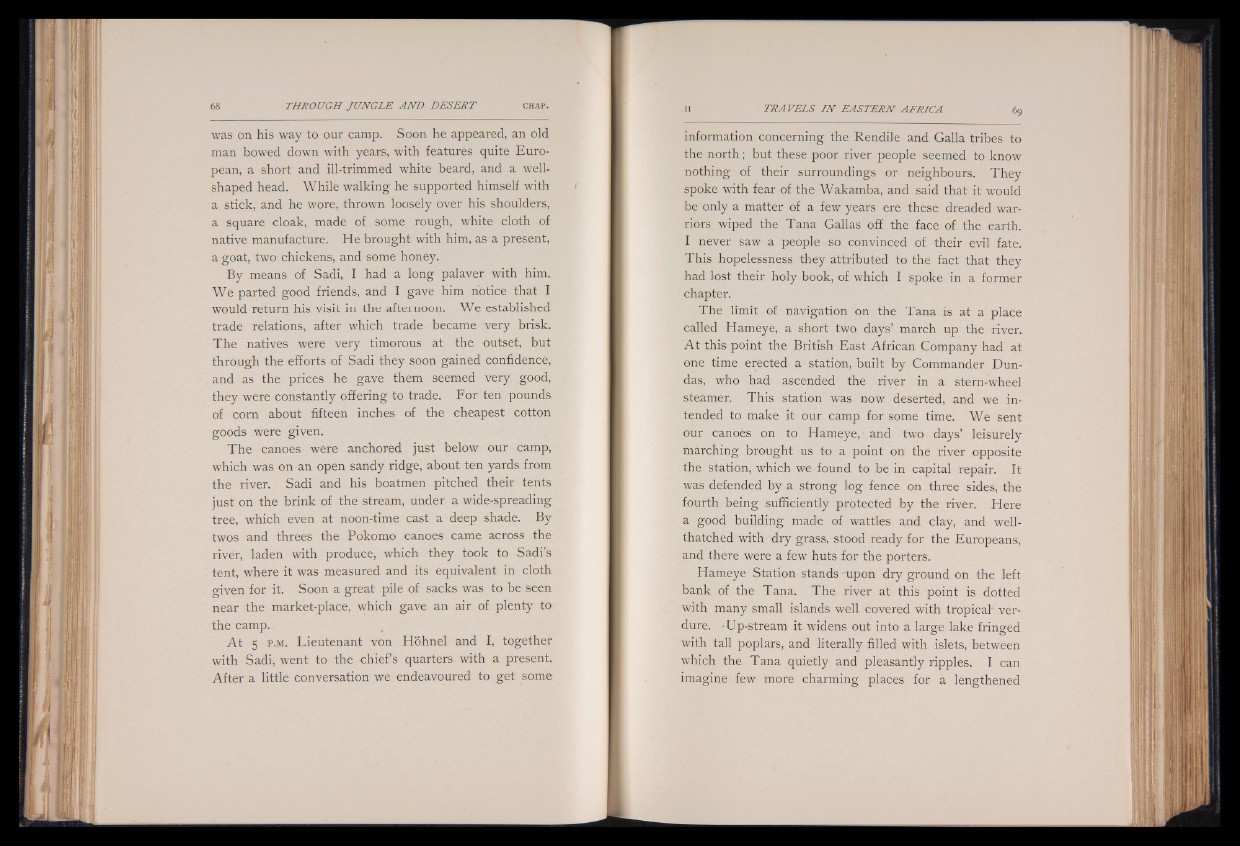
was on his way to our camp. Soon he appeared, an old
man bowed down with years, with features quite European,
a short and ill-trimmed white beard, and a wellshaped
head. While walking he supported himself with
a stick, and he wore, thrown loosely over his shoulders,
a square cloak, made of some rough, white cloth of
native manufacture. He brought with him, as a present,
a goat, two chickens, and some honey.
By means of Sadi, I had a long palaver with him.
We parted good friends, and I gave him notice that I
would return his visit in the afternoon. We established
trade relations, after which trade became very brisk.
The natives were very timorous at the outset, but
through the efforts of Sadi they soon gained confidence,
and as the prices he gave them seemed very good,
they were constantly offering to trade. For ten pounds
of corn about fifteen inches of the cheapest cotton
goods were given.
The canoes were anchored just below our camp,
which was on an open sandy ridge, about ten yards from
the river. Sadi and his boatmen pitched their tents
just on the brink of the stream, under a wide-spreading
tree, which even at noon-time cast a deep shade. By
twos and threes the Pokomo canoes came across the
river, laden with produce, which they took to Sadi’s
tent, where it was measured and its equivalent in cloth
given for it. Soon a great pile of sacks was to be seen
near the market-place, which gave an air of plenty to
the camp.
A t 5 p .m . Lieutenant von Hohnel and I, together
with Sadi, went to the chief’s quarters with a present.
After a little conversation we endeavoured to get some
information concerning the Rendile and Galla tribes to
the north; but these poor river people seemed to know
nothing of their surroundings or neighbours. They
spoke with fear of the Wakamba, and said that it would
be only a matter of a few years ere these dreaded warriors
wiped the Tana Gallas off the face of the earth.
I never saw a people so convinced of their evil fate.
This hopelessness they attributed to the fact that they
had lost their holy book, of which I spoke in a former
chapter.
The limit of navigation on the Tana is at a place
called Hameye, a short two days’ march up the river.
A t this point the British East African Company had at
one time erected a station, built by Commander Dun-
das, who had ascended the river in a stern-wheel
steamer. This station was now deserted, and we intended
to make it our camp for some time. We sent
our canoes on to Hameye,' and two days’ leisurely
marching brought us to a point on the river opposite
the station, which we found to be in capital repair. It
was defended by a strong log fence on three sides, the
fourth being sufficiently protected by the river. Here
a good building made of wattles and clay, and well-
thatched with dry grass, stood ready for the Europeans,
and there were a few huts for the porters.
Hameye Station stands upon dry ground on the left
bank of the Tana. The river at this point is dotted
with many small islands well covered with tropical verdure.
-Up-stream it widens out into a large lake fringed
with tall poplars, and literally filled with islets, between
which the Tana quietly and pleasantly ripples. I can
imagine few more charming places for a lengthened